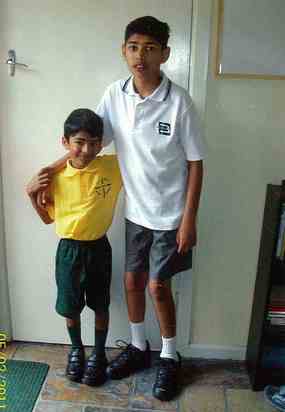Cameron Rodrigues

Alternate Media
Cameron’s mother Lorraine wrote Cameron’s story.
Cameron is a 16-year old teenager—smart, intelligent, witty and unsophisticated. He lives with his parents Lorraine and Anthony and his six-year old brother Callum. He is studying in Year 9, at the local state secondary school accessing an inclusive education.
He was diagnosed with an epileptic syndrome called Dravet Syndrome—a syndrome that has been resistant to medication and treatment. He has severe expressive communication, autistic-like features, uncontrolled seizures and an impaired motor ability.
This has taken a huge toll on all aspects of his life. Cameron does not have an intellectual disability and is high functioning in his ability to learn and absorb the regular school curriculum. He is well aware of his limitations his disability imposes and finds this frustrating, debilitating and very trying particularly at the adolescent stage of development.
Cameron has attended mainstream regular schooling throughout his academic life. To be able to access such an educational system, has been an enormous challenge and hurdle because of the numerous physical and psychological barriers such a system creates.
These barriers are fraught with ‘excuses’ such as lack of resources and supports, rigid organisational structures and strait–jacketed systems of learning and teaching. But the single factor responsible for the lack of inclusion has been negative attitudes towards disability.
No matter how much funding or resources are poured into a school, if the school leaders and teachers have a negative attitude, even the best of intentions can be marred by unworkable, unplanned and questionable actions.
Living with a child who has such a life threatening medical condition, has been challenging in its own way.
The numerous appointments to doctors and therapists, trialling various medications and coping with their side effects, unpredictable crisis when seizures occur out of home, and working flexible work hours in order to available in case of an emergency, has made life revolve around caring for Cameron’s needs at all times.
This places a huge strain on us as a family because routines, levels of stress, tiredness and fatigue are constant. Having back-up plans in place, being very organised and focused on tasks, being well informed as a parent and drawing together supports has helped enormously.
Our goals as a family are to give our children the best quality of experiences and opportunities life has to offer so that they can grow, learn and make the most of what life throws at them.
What we need is the continued support of carers, volunteers, tutors, and extended family members to make this journey a positive and rewarding one. We have met people who have had great hearts of gold and embraced differences and challenges as part of life’s struggles. Others who have walked in and out of our lives just helping us in their own best way—to them we say thank you because without them we would be bereft of our sanity at times.
Our attitude to life when caring for a young person with disability, is to presume competence at all times, give them a fair go, empower yourself as a parent to be strong and stay strong, and associate with people who are positive and have emotional resilience to keep you focussed and persistent.
In this way, the journey is looked upon not as a burden but as a challenge to learn from and support others to bring about change in the lives of our children and families.
Have the self-belief to try new things, the passion to persist and the flexibility to know when to let go. Trust your gut instinct at all times—it is never wrong and when in doubt seek advice, support and help.
© Cameron Rodrigues and Lorraine Rodrigues 2011. Except as provided by the Copyright Act 1968, no part of this publication may be reproduced, stored in a retrieval system or transmitted in any form or by any means without the prior written permission of the author.